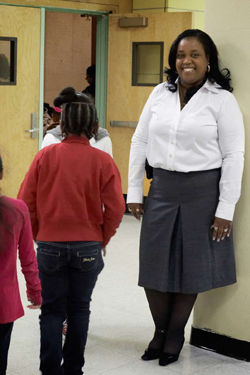Transformative Leadership, Under Fire
As Principal of P.S./M.S. 161, Barbara Freeman has fended off a threatened takeover and boosted student performance
In 1999, when Barbara Freeman became principal of P.S. 161 on West 133rd Street Harlem , she faced some tough challenges. The school had been languishing for six years on the state’s list of Schools Under Registration Review (SURR). Just 24 percent of its students were proficient in math and only 11 percent in English Language Arts. And to boot, in a heavily Latino school in which 87 percent of students were English Language Learners, Freeman herself spoke only limited Spanish.
Still the City, which was in the midst of a broader initiative to jumpstart reform in SURR schools and begin holding them to higher performance, had its reasons for putting Freeman in charge at 161. Most notably, she had previously served as an assistant principal at struggling schools in the South Bronx and Brooklyn ’s Bedford Stuyvesant neighborhood. Tough and smart, she also has an easy laugh and the ability to work with people and hear their concerns.
Drawing on her experience and backed by a package of City-mandated funds and programs, Freeman made good headway at 161—but a year into her efforts, she knew there was a still a long way to go.
Then City officials proposed that P.S. 161, which at that time served grades pre-K through 6, be turned into a charter school under the management of Edison Schools, a private company. Freeman convened the school community to discuss the impending change, but also strove to publicly maintain an appearance of impartiality, so that parents could decide what would be best for their kids.
The result was gratifying. The school community mobilized itself to keep 161 in City hands and under Freeman’s continued leadership. Parents organized to fight the plan and became involved in school issues. Teachers began tutoring kids during cooperation periods and at lunch.
“They were doing whatever they needed to do to make sure the kids were successful,” recalls Freeman.
When it came to a vote, parents rejected the Edison takeover. Better still, they stayed committed to all the new efforts they had set in motion.
Today, 86 percent of students at the school—officially known as P.S./M.S. 161 Pedro Albizu Campos—are
proficient in math, and 70 percent are proficient in English. Freeman, who is now pursuing a Teachers College doctorate in educational leadership, says the proposed Edison take-over transformed the school’s culture and brought the kind of change she knew was needed.
“That incident hastened reform by five years,” she says.
Since then, Freeman has implemented a reform plan that has focused on accountability, teacher quality and development of the school’s transitional bilingual program to increase the focus on learning English. The latter priority, Freeman says, has required particular diplomacy.
“The last thing I wanted parents and teachers to think was that an African American principal is coming in—not really validating their culture and their instructional way of their kids—and dismantling a lot of things,” she says. “However, the programs weren’t working. So it was my job to show them how they were not working.”
During 2006, Freeman honed her leadership skills at the Cahn Fellows Program for Distinguished New York City Principals at Teachers College—a 15-month program for those administrators looking to boost academic achievement and improve the learning environment in their schools. The fellowship includes a visit to the U.S. Army War College and the Gettysburg
As part of the Cahn Fellowship, principals identify a challenge at their school to work on during the program. Freeman has concentrated on the adjustments that 161 has needed to make as it has added grade 7 and plans for the addition of grade 8.
“How strategically you use your leadership became a big eye-opener for me,” says Freeman.
Those leadership skills are now being tested as she works to improve her school at a time when test scores are
up, and pressures for change aren’t coming from downtown. By studying at TC while continuing to lead at P.S. 161, she’s able to see how her theoretical work plays out several blocks north of campus on West 133rd St.
Published Monday, May. 10, 2010
